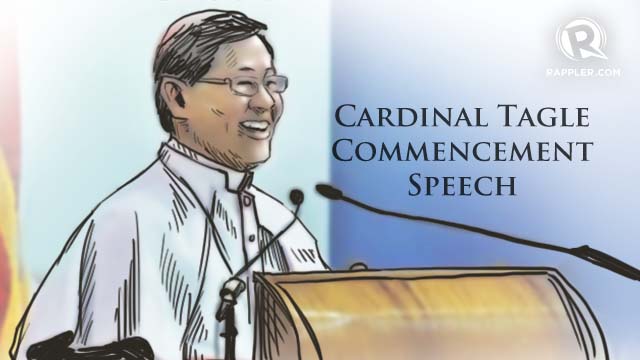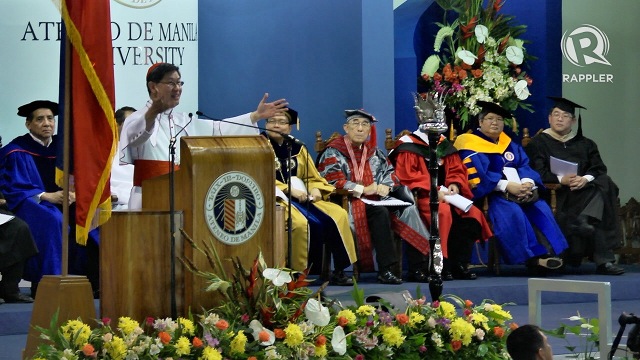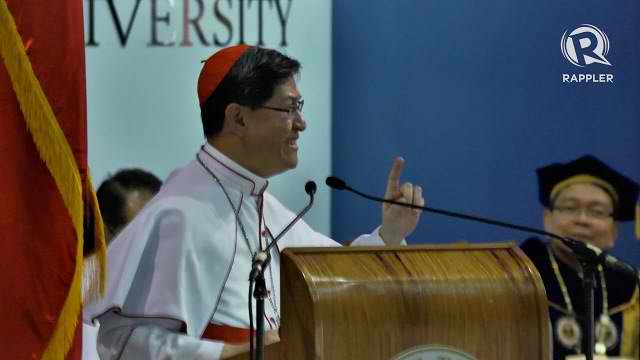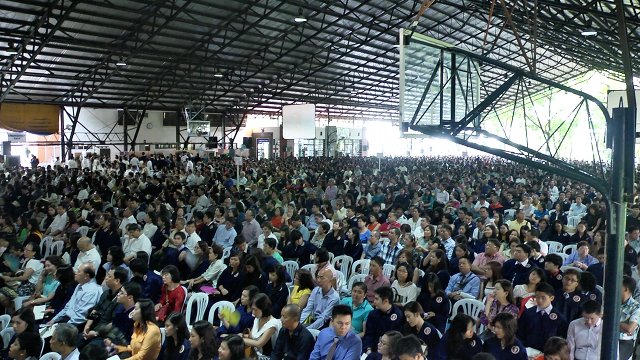SUMMARY
This is AI generated summarization, which may have errors. For context, always refer to the full article.

MANILA, Philippines – On March 22, 2013, Manila Archbishop Luis Antonio Cardinal Tagle addressed the Ateneo de Manila University’s Class of 2013 and left them with these words of advice.
Good morning to you all.
I would like to thank the Board of Trustees (of the Ateneo), under the leadership of its president, Mr. Edward Go, and the management of the University, especially its distinguished head, Father…what was his name again? Fr. Jett Villarin, SJ.
To our teachers, to the families, and especially the parents of the graduates.
I also thank the university staff, from the guards, the cleaning staff, those in the canteen, and those who quietly bring life to the school, but who are rarely seen.
I’d especially like to thank those graduating. Thank you for inviting me to speak to you this morning.
What Fr. Jett Villarin said was beautiful, so I could actually shorten my speech. I could say, “Take to heart what he said, and thank you.”
But I stand in front of you now, so I will own up to it. I will not take too long because I know that many graduates take no interest in listening to the commencement speech.
Wow. You guys are different.
(Crowd laughs)

When I graduated in 1977, the centennial of Jose Rizal’s graduation, if you ask me what the speaker said that day, I will admit, I don’t remember a thing.
We simply wanted to graduate and face the world. That’s what you want. Perhaps some of you are in a rush to leave the university. Don’t worry; the management and the teachers are in a rush to have you leave.
Everything is joyful.
Yesterday, I was supposed to be at Xavier University. Another university managed by our brother Jesuits asked me to speak. Yesterday, however, I had just come back from Rome.
The conclave was actually tiring, but we thank the Lord for the blessing of there being a Pope.
At his second mass for us cardinals, he said, “My father is Saint Ignatius.” Though he may be far away, can we please have a round of applause for this son of St. Ignatius whom we now call Papa Francesco.
(Applause)
Make it louder, he’ll hear it!
Just some reminders for the graduates. Especially because the world knows that you lived, grew, and finished in a Catholic university, a university headed by the children of St. Ignatius.
When I recount my time in this campus as a student, and I realize I have remained here, still teaching…this is the virus of the university at work — when you enter the system, it it so difficult to leave.
When I finally graduated in 1977, I taught Philosophy here at the University. After a few years, I switched to Theology at the Loyola School of Theology. Up until now, I still teach. I see in the crowd that some of you were my former students. I really have aged. It seems they learned something though.

Finding your true purpose
As students and, as Pope Francis said, as a son of Ignatius, what blessings have we received? Each blessing has its own obligations and responsibilities. There are many, however, I wish to point your attention to a specific few.
The first is this: as graduates of the Ateneo de Manila University, I hope we can be of help as children of St. Ignatius. To help people, our society, and all of mankind, in their search for a purpose in life.
In the small or significant events in our lives, we see this great wound in humanity as people travel through life as if it meant nothing, as if there was no purpose to it, as if their lives had no direction.
Then there are those who say, “I have a goal in life. I have a purpose in life.” When you look at them, what is their purpose? It doesn’t seem true and pure.
In St. Ignatius of Loyola’s Spiritual Exercises, the starting point of reflection, called the “First Principle and Foundation” begins like this: Man is a being meant to praise, respect, and serve God, and by so doing we find our salvation.
While the language of Ignatius might be, as others will say, medieval, the truth that he conveys is quite eternal.
Why are we here? What is your life’s aim? According to St. Ignatius, man lives for a life of praise.
Smile, why don’t you? It’s like you don’t offer praise. There.
With other people, their faces seem like they were born to be desperate. But they’re not. We are people born to praise God. Not only to praise, but to respect, to despair, to kneel, just like Ignatius. To humble himself before someone greater.
However, praise and respect comes back to service. “Here is your waiting servant, send me. Where You wish for me to serve, there I will be.”
If we look at that, the purpose of life is to go beyond oneself. If we look at the three keywords — to praise God, to revere God, to serve God — the purpose of the human person is to get out of our confinement, to get out of our shells, to get out of ourselves, and to reach out to God in praise, in reverence, and in service.
And it is only by losing ourselves that we find our true selves.
Salvation. Life. This is the sign of a child of Ignatius. You graduates, when you are asked, “What is your purpose in life?” and your answer is, “I want to be prosperous.” We have a problem.
“I want to be famous.” We have a problem.
“I want to be rich.” We have a problem.
Children of St. Ignatius, what is your life’s purpose?
Many of you have probably read about how the conclave is conducted. That’s been published, so I don’t think I’ll be breaking an oath of secrecy today since it’s been published.
When I was reading it, I said to myself, “What a lot of rituals. That’s going to be tiring!” I couldn’t memorize and recall all the things that needed to be done for each part of the conclave.
Especially that part where when you take your ballot to the altar, and each ballot, each vote, the cardinal has to read something goosebump-inducing while holding his ballot – “I call on Christ, our Lord, as my witness and he will judge me when I face him at the end of my life, and in front of Him, I say that the name I’ve written here is the one I’ve chosen according to my conscience as the one deserving of being the Pope.”
Would you believe that since there were 5 votes, we had to do this 5 times each? After the first time, I said, “Can’t we do this at the start, and then move on?” You know, I eventually saw the point of it.
For me, it was like the whole conclave was like a long liturgy. It was a long period of worship. It was a long period of refocusing. What is the purpose of your being here?
And you died to self, you died to your projects, you died to your opinions and your programs. And you seek only what is God’s purpose.
And if you’ll see, little by little, when the purpose became to praise God, to respect Him and His wishes and serve Him, would you believe that 115 people voted for a single head for over a billion Catholics? After two days, it was done, and all went back to normal.
Compare that to the times when we can’t always discern who won the mayorship, who became congressman, who became governor, and even who the president was in the previous election. Why? Because the voting process did not have a clear purpose. When the purpose of man is broken, the purpose of society is broken.
How many graduates are here? 4,000. Some might say, what can 4,000 do to create change for 60,000,000 Filipinos? Don’t underestimate yourselves. 115 cardinals presented a Pope to a billion catholics.
If your purpose is clear, and it is not directed to self-promotion and self-propagation, then you can really be an asset to society and to the world.
You can smile you know? There you go. (Jokes) I think you guys want me to sit down.
So that is one of things I regularly come back to. I recount the things I’ve learned from St Ignatius and his children, the Jesuits.
Go back to the purpose of your existence.
Spreading a culture of depth
The second thing I ask of those graduating, and this is part of the root of our lives as people of God, is to be of service to mankind. I do hope the graduates can help in spreading a culture, a culture of depth.
It’s saddening to note how easy it is to accept the spreading culture of superficiality. Let us become so attractive that it bothers us.
Now, what is this “depth?” You graduates might think, “Oh alright, I’ll show the world how deep I am,” and in your daily lives you speak in a manner that makes it hard to be understood. And when you’re asked what you just said, you reply, “Sorry, my language is so deep you cannot understand me. Because I’m an Ateneo graduate.”
Let us not confuse others. Depth isn’t the loss of the ability to be understood. True depth is easily shown, especially in quiet and simple ways.
Finding God in all things
Some of you graduating may be in tears after one lecture. Sometimes, you leave the classroom not in tears, but in anger. Why is it, however, that a simple story about a simple man is just right in its depth?
Where can we get this depth as children of Ignatius? We get it in our spirituality – in finding God in all things.
Because God is the heart, the depth within every person, within every occurrence, within the history of the world.
A mind and heart with a clear purpose seeks God. Perhaps it can also be said that God wants to be found in the times when we feel our purpose is unclear. In the times when we feel we can’t see Him, perhaps He’s the one searching for you. That is part of depth.
When someone comes up to me and says, “I feel lost,” I don’t always know what to say. Sometimes though, I just say, “ Just wait to be found. As you are searching for God, God is searching for you.”
That profound humility that made an Ignatius open to anything that the Church would want him to embrace– that depth of seeing God, hearing God, loving God in all, and following God even in the darkness of your life, hoping and believing that the One you are searching is searching for you.
I hope this depth gives meaning to the soul-searching of many, such as those who feel as if their life’s travels are always blocked. I hope this bit of learning imparted to us by St. ignatius stays with us, to seek Him at all times and, if we can’t find Him, to believe that He is searching for us as well. this is what will give strength, light, and fortitude for many people.
I hope it’s alright for me to wipe (wipes tears).
‘Do not forget the poor’
Back at the conclave, when we were almost nearing the number needed to elect a new Pope, I was nervous. “Will we reach the number?”
Because if we didn’t, we’d have to come back the next day and vote again.
When the number was reached, you can believe there was a different kind of joy.
When I looked at Cardinal Bergoglio, I suddenly felt sad. I felt pity. What is this we have done? We were, perhaps, happy thinking, “Oh we can finally get out of here! We’re dropping everything on your shoulders.”
What’s funny though is that, when I joined him at the dinner table, he told stories and you could see the heart of a child of Ignatius. Beside him at the conclave was Cardinal (Cláudio) Hummes of Brazil, a retired cardinal. When it was clear that he was elected, Cardinal Hummes whispered to him, “Don’t forget the poor.”
It’s as if he was being reminded, “The whole world will raise you up. Don’t forget those below, the poor. According to him, this kept rolling around in his head. “I poveri, i poveri. The poor.” From there, a name, “Francesco il poverello. Franics the poor man.”
And he said to us, “I forgive you, and may God forgive you for electing me.”
But you could see, finding God in all things, he wasn’t blind to the weight. But God speaks to us, He is here, speaking to the cardinal, speaking to Cardinal Hummes. Listen. Even the name seems given to him.
There was depth, because there was God.
Carrying on the compassion of Christ
As an end to this speech for the graduates, I ask that, when you leave for other corners of life and of the world, bring the humility and mercy of Christ. The compassion of Christ. The mercy and love of Christ.
One thing I won’t forget from St. Ignatius’ spiritual exercises is the opportunity offered to those praying: “Face Jesus who is crucified on the cross. Face Him and feel His love, the love that was ready to give everything for your sake. That’s how much He loves you: He would give His all.”
And ask yourself now, what can you give and do for Him, and what can you do for others because God loved you? He loved you, and you are capable of loving too. Don’t say that you can’t do it, because the love of God was showered on your heart. You have the capacity to love. You were loved, so love others in return.
Tell stories, listen to stories
But you have to be attentive to the suffering of the world. Even when they do not verbalize their suffering, these people have many ways of communicating their suffering.
In my experience, especially as a priest, many people come to me carrying their life’s burdens, their problems. Sometimes you’re able to offer solutions, but why is it some people keep coming back?
At this point, I’d like to thank a writer. When I read his work, I thought, “This is my experience.” It’s Bob Johansen. He said there are people who don’t carry problems, but dilemmas.
Problems can be solved but you cannot solve dilemmas. Dilemmas continue. You can solve problems that you can only make sense of dilemmas. People with problems seek solutions, but people in a situation of dilemma will look for meaning, will look for sense. And that’s where compassion enters.
We can’t solve all the world’s problems. For many people, however, they don’t carry problems, but dilemmas – they are life’s ironies, they are problems that won’t go away because they lack a solution.
How do we find sense or meaning in the middle of life’s dilemmas. You know what I learned? To problems, give solutions in clear formulae. For those with dilemmas, tell stories – stories of courage. Tell stories of valor, of dignity, of nobility. And they are strengthened to move on. But how can you tell stories if you don’t listen to stories?
Listen to people. Listen to the cries of the little ones – those who are experts because their lives are a neverending dilemma. If you look at Baseco, if you look at Tondo, there you will see the sweetest smiles.
Why don’t you folks smile? (Applause)
Why is it those people who can’t escape dilemmas are the ones with the strength, the ones who hold joy? And those with the problems are so cute – what shoes will match the clothes I’m wearing? – those are the types of people who can’t find joy.
Listening to their stories, and telling the stories to others, we become agents of hope.
That’s the Spiritual Exercises of St. Ignatius. It’s a retelling of the story of Jesus who encountered dilemmas but who taught us to turn these dilemmas into opportunities for meaning, for strength. He who turned the night of betrayal into another opportunity of self-giving – “O Judas, you don’t have to sell Me for 30 pieces of silver. You don’t need to sell My body for this is My body given up for you. This is My blood to be poured out for you.” – and who turned this dilemma of death, this darkness of death into an opportunity for a new life, not only for Himself but for all of us. This is the story of Jesus that ties our tale together.
These are the stories that St. Ignatius loved, and are the stories of his Children. In my listening to these stories, which will become stories for others, I hope the world will grow more kind-hearted, more personable, more open to listening, more commiserating and in solidarity with our fellow man.
Filipino pride
I will tell one last story. Maybe some of you haven’t had breakfast yet. I know I haven’t.
These past few weeks, because of Pope Bendict’s resignation and the preparations for the conclave, there was a lot of speculation, especially on social media and with the Vatican observers. What sort of Pope would be elected? What will the Church’s direction be?
I’m sure you’ve seen many names pop up, and many cardinals from various parts of the world were always mentioned. To my chagrin, I was one of those whose names was repeatedly mentioned. I stopped watching TV, I stopped going on the Internet and I stopped reading the papers because it gave me goosebumps to learn what was being said about other cardinals as well as what was being said about me.
I couldn’t believe it. Was that me? It didn’t feel real. So I said, “That’s enough.” Yesterday, I was asked at the press conference about how I felt when I wasn’t elected to become Pope.
Would you believe someone would ask that sort of question? It’s a good thing I was taught by the Jesuits how to answer such questions.
I said, “It’s clear to me that the task of the Cardinals was to elect a pope and not to get myself elected.”
(Applause)
Here’s the thing. When I got to Rome to attend the meetings and the conclave, I was shocked at the power of media. I was walking along a street when some Italians passed me by.
“Oh, Cardinale Filipino! Can we take a photo?”
I thought it would only happen here. The day before the beginning of the process, there was a Philippine family that invited me to a restaurant, and I joined them for lunch. When I entered, there was an Italian family eating.
They saw me and said, “Oh, il papa Cinesi… the Chinese pope!”
They stood, asked pictures, and other people eating saw us. They stood, asked for pictures. Even the restaurant owner heard about it and called his brother, his son… they came, they asked for pictures.
I was melting. I felt like praying for an earthquake to come, to split the earth and swallow us all so we would all disappear. You don’t really like it, but that’s what we were taught as Jesuits. You have to be humble.
(Applause)
You have to be shy. You have to shy away from the limelight. It’s not acting, however. When other people get featured, it seems okay to just watch. When it’s your turn, it’s as if you don’t know what to do.
So the conclave ended, and I went to Padova two days after. Because my name is Luis Antonio – Saint Antonio di Padova.
I was surprised.
Even in Padova, people knew me. On the streets, people asked for a photograph. The German tourists, the English tourists, they all asked for photos. I felt strangled, and I was getting angry..
What brought me back to my senses? What made me see God in this so unpleasant experience? What turned my irritation to compassion?
There was a Filipina working in Padova. Most of the Filipinos there are domestic helpers. She came to me, and said, “Cardinal, can I take a photograph with you?”
I said, “Sure, go ahead.”
After the picture, she told me, “Even though you didn’t become Pope, I wanted to thank you, The world started recognizing Filipinos. When you were talked about in the newspapers and on TV, our bosses started acting nicer to us.”
(Applause)
“The dignity of the Filipinos was raised.” (voice cracks)
(Tagle cries)

That wasn’t part of my plan. But even in annoying experiences, God is there. And I didn’t know.
That wasn’t for me. That was for those feeling sad, the Filipinos who were belittled, who were treated poorly night and day.
I said to myself, “This is okay.” Yesterday, I thanked the media. Thanked them for their interest in the Church and the papacy. I didn’t say that, due to their interest, our fellow, suffering Filipinos benefited from the attention.
It’s a story that I will always narrate, not for myself but for our poor brothers and sisters, who are looking for little signs of hope. And in my unknown way, if I could be of help to them, then let it be, let it be.
For the greater glory of God
Why are you crying? I said I would stop crying… but what can I do?
To those of you graduating, you were given a great blessing. A blessing that, up till now, some 30 years since I was a student at the Ateneo de Manila University, that blessing doesn’t grow old, and it doesn’t fade.
Every so often I am nudged. Every so often, something wakes me. Every so often, I am given a viewpoint on life and on serving others. That’s what you have now. That blessing is yours.
With that blessing, I hope many more people, especially within the Philippines, return to a true path in life. Outward from the self. May we discover that deep truth of history because God is with us.
May we listen to the stories of Jesus in the simple tales of those less fortunate. And with those tales, may we spread genuine love throughout the world.
All of this is something we can do, not for ourselves and our search for new heights or joys. But rather for one thing: only for the Greater Glory of God. – Rappler.com
Add a comment
How does this make you feel?
There are no comments yet. Add your comment to start the conversation.